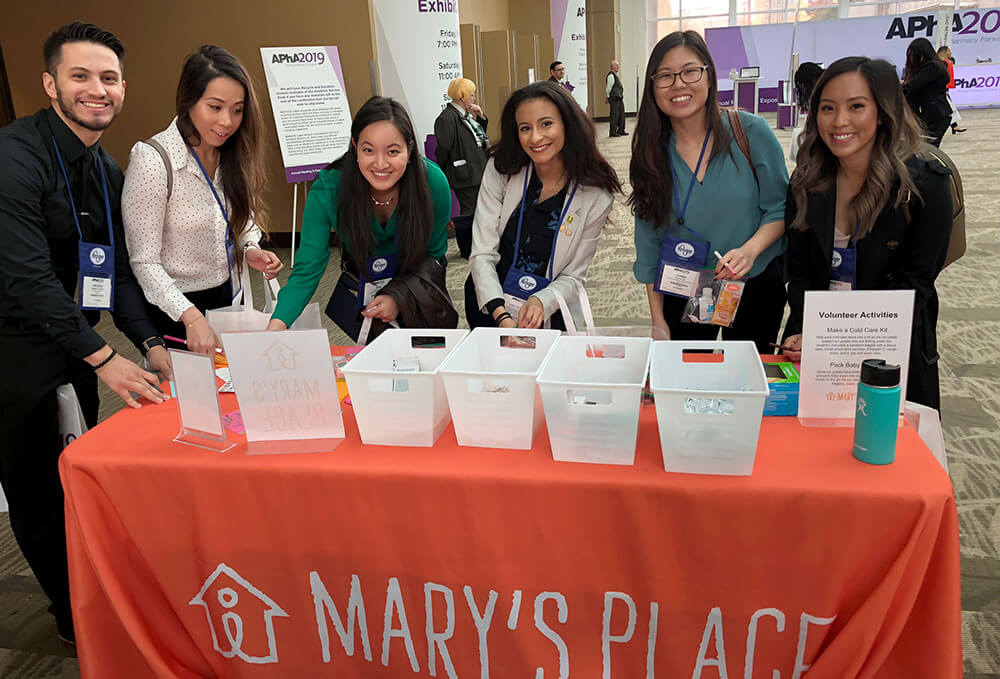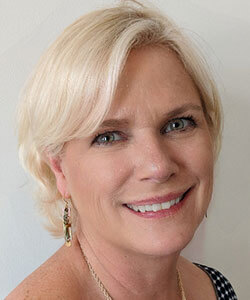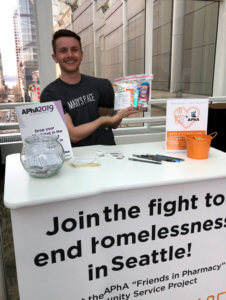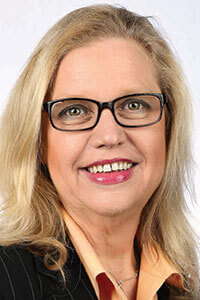
More than 1,000 attendees at APhA’s 2019 conference in Seattle volunteered to pack cold-care and comfort kits, and make birthday cards, for Mary’s Place. (Photos courtesy Windy Christner)
In Spring 2019, Windy Christner, CMP, senior director of meetings and expositions for American Pharmacists Association (APhA), was unnerved by what she experienced in downtown Seattle during a site visit for APhA’s then-upcoming annual meeting at Washington State Convention Center. In the short time it took to walk from the hotel to the convention center, she and her team saw three individuals passed out and on the ground. The air reeked of urine, and one man followed someone on Christner’s staff, demanding cash. (Read the Convene October 2018 cover story.)

Windy Christner
Such encounters aren’t uncommon in U.S. cities, where homelessness has been rising in connection with factors that include a crisis in affordable housing and an epidemic of opioid use. What is rare, however, is what happened next: First, Christner spoke out, in a letter outlining her concerns about the safety of the more than 6,000 attendees who were expected at the meeting, which she addressed to Visit Seattle CEO Tom Norwalk.
“I am empathetic for the plight of those in need,” Christner wrote, “and realize that Seattle is by no means alone. However, the safety and security of the APhA attendee is my first priority, and I am extremely concerned.”
And then Christner and her team sat down with Visit Seattle staff and the leaders from other Seattle organizations to work out a plan that not only addressed the safety and security of meeting attendees, but gave them an opportunity to make a real difference in the lives of Seattle families who are affected by homelessness.
The experience not only altered the trajectory of the 2019 APhA meeting, held March 22–25, but turned Christner into a passionate advocate who is urging meeting professionals to leverage the power of meetings to help change the face of homelessness around the country, rather than try to avoid it. “It’s time that we focus on going to the cities who need our help,” Christner said, “instead of using it as an excuse to stay away from them.”
Straight Talk in Seattle
Christner credits the Visit Seattle team and its chief executive with playing a big part in influencing her resolve. Norwalk is “one of the most courageous and vested CVB presidents I have ever known,” she said. “He is out in front, to do what it takes” to face the problem and find solutions, she said.
It was Norwalk who suggested that Christner document her concerns in a letter, which he shared with Seattle’s mayor. Norwalk’s team also set up a meeting between Christner and representatives from the Seattle Police Department and Downtown Seattle’s safety ambassador program to discuss how the area around the convention center would be patrolled during APhA’s meeting dates. The safety ambassadors work not only to keep the streets clean, but also to assist unsheltered residents.
RELATED: Hacking Homelessness at EduCon
Under Norwalk’s leadership, the convention services team has been directed to bring the issue of public safety up during planning visits and to not avoid talking about issues related to homelessness — conversations that are not easy to have, said Katy Willis, director of convention services for Visit Seattle. “We talk a lot about the difference between homelessness and public safety,” Willis said during a webinar held last June by the Events Services Professionals Association (ESPA), about how the industry is taking action on the issue. “Homelessness is layered,” Willis said. It’s easy to criminalize people for being homeless, “even though we know that not all homeless people are criminals.”

APhA provided Mary’s Place a high-visibility spot for its booth on the exhibition floor. Attendees were able to pack kits, donate $2 per badge swipe, and give cash donations for chances to win prizes.
For Christner, a major takeaway was what happened through her organization’s partnership with a local nonprofit, which was facilitated by Visit Seattle’s convention services team. Visit Seattle set up initial interviews for Christner with three local organizations for her to consider; the one that most resonated with the APhA’s mission was Mary’s Place, which supports homeless families in getting permanent housing, Christner said. During their interview, “we talked primarily about sick children living in cars waiting for their next chemo, their next dialysis, or for their feeding tube to be changed,” said Marty Hartman, the executive director of Mary’s Place. Christner’s response was: “We think we can come together and do something about that.”
Helping Mary’s Place
APhA went all in, giving Mary’s Place a booth with high visibility on its exhibition floor, where more than 1,000 attendees stopped by over the course of the meeting to pack cold-care and comfort kits, and make birthday cards. The meeting exhibitors also had an opportunity to participate, donating $2 per badge swipe to the nonprofit, an initiative that raised several thousand dollars. APhA also sold T-shirts and collected toiletries and cash donations for chances to win prizes that included hotel-room upgrades and free registration for the 2020 annual meeting. At the meeting’s conclusion, APhA and exhibitors donated surplus materials, including granola bars, hand sanitizer, stuffed animals, umbrellas, and other items, along with chairs, tables, and 20 gallons of medical supplies. In all, over a few short days, APhA donated more than $9,000 to the nonprofit, in addition to in-kind contributions.
APhA already was in the habit of choosing a local charity in the destination where the annual meeting is held and making a contribution. But the partnership with Mary’s Place, and the nonprofit’s presence at the meeting, created a level of emotional connection with attendees that was “totally unexpected and positive,” Christner said. She learned, she said, that when attendees are directly confronted with individuals in need, they want to help. “But they don’t know how or they are not given an avenue. We want to discourage people from giving out money to panhandlers and give them an alternative — to meet the people and organizations who are doing something about the problem.”
Galvanizing the Industry
Less than a year after her team’s uncomfortable site visit in Seattle, Christner took a few minutes during the APhA annual meeting, where she, along with representatives from Mary’s Place and Visit Seattle, recorded a video to encourage other meeting professionals to undertake similar initiatives directed at alleviating homelessness. “It’s easy to incorporate into your meetings,” Christner said. In addition to changing lives, “the positive things that will happen between your association and your attendees are invaluable.”

Donna Jarvis-Miller
In 2020, Christner’s organization will hold its annual meeting at the Gaylord National Harbor Resort and Convention Center in Maryland, March 20–23, where APhA “will again partner with a local nonprofit focused on getting families off of the streets.”
Christner has continued to speak on the issue, appearing as part of a panel at Destinations International’s annual meeting in St. Louis in July 2019, among other industry meetings. She’s teamed up with Donna Jarvis-Miller, CMP, CEM, director of membership and events for the American Public Human Services Association (APHSA), who, like Christner, created opportunities for attendees to take action against homelessness. When APHSA met in Seattle in September 2018 for ISM Conference, attendees donated supplies via an online registry to the Compass Housing Alliance, which provides food, temporary shelter, and permanent housing in Seattle and a smaller group cooked for residents at the shelter and then sat down to share a meal and conversation. The in-person event was sold out two weeks after registration opened, Jarvis-Miller said.
Christner and Jarvis-Miller combined forces to present a “road show,” which aimed at influencing meeting planners to move toward, rather than away from, the shared problem of homelessness, Christner said. As meeting professionals, “we can do something to help start a mini-revolution.”
Barbara Palmer is Convene’s deputy editor.
RELATED: Watch the APhA/Visit Seattle video concerning Mary’s Place.
